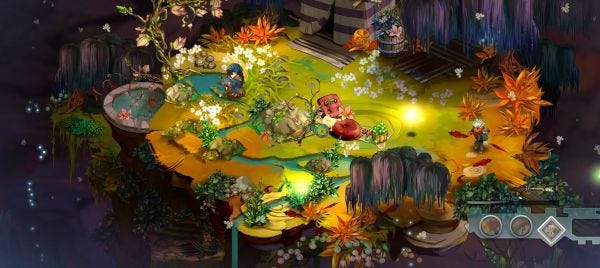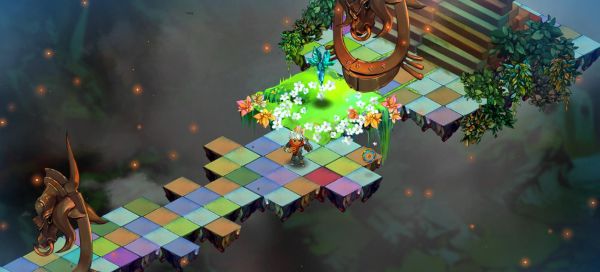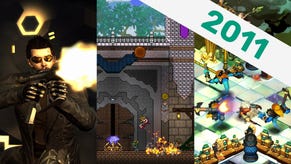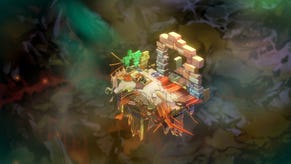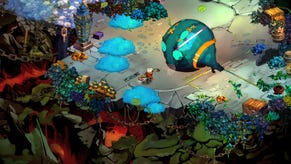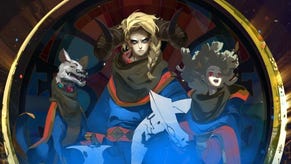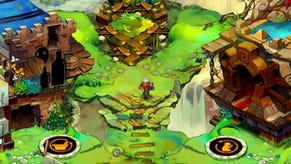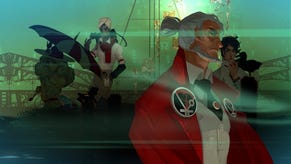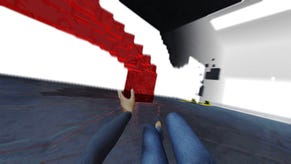Wot I Think: Bastion
Well Fortified
Action RPG Bastion was released on Steam yesterday. I've been weaving my way through its enchantingly morose worlds, and although still a good way from the end, I am absolutely ready to tell you Wot I Think.
Going into a game completely blind is a rare treat. I recommend you don’t read this, but instead just go and buy Bastion and play it. Sure, you don’t know what type of game it is – nor did I when Jim said, “Hey, I think you should review this one.” It’s £11.50, go to it.
Some people remain. Well, I warned you.
The Bastion is a floating land of peace in a broken world, the only safe place left after the Calamity. A bare few people survive, and amongst their thin number is a kid. You don’t know who he is, why he’s there, who he was, or why he persists. The point is not knowing. His only company from the start is the narrator, a deep, throaty voice of a Southern gentleman, discussing the events as you play as a detached third party. He’s your only friend in the Bastion, that hub between the danger of levels.
From the opening seconds it’s obvious this is something special. As you run forward on floating tiles the pathways fall down from the sky to build themselves around you. The world fills itself in as you approach it. The narrator makes a wry comment about the kid’s nonchalance to this. A gorgeous cartoon world, glowing with colour, creating itself as you explore it.
The core of the game itself isn’t enormously original. The closest genre would be an ARPG, the kid equipped with a range of weapons and abilities, collecting drops and fighting many, many enemies. But the environment in which it’s set, the atmosphere created, and the purpose behind your playing is what makes this so compelling. It’s a real case of the important success of style over substance.
That’s not to say the action is a problem at all. It’s really not. As you play you’ll find new weapons, two of which can be equipped at a time. So perhaps you’ll have a giant hammer for one, and a shotgun as the other. Or fast blades and a bow and arrow. Each of these weapons can then be upgraded in the Bastion using items you find on travels, paid for by Fragments, the tokens dropped when enemies are killed or objects smashed to bit. Fragments of the old world, before the Calamity.
Along with the two attacks you also have a shield, which lets things get more tactical. As well as obviously being a block, good timing allows you to deflect attacks back onto the attacker. There’s also a dodge, that lets you roll quickly out of the way. And on top of all this you have special abilities that give you bonus tricks. Perhaps you’ll take with you the ability to raise a friendly Squirt, the strange tadpole-like creatures that would otherwise attack you. Maybe a technique that lets you spin on the spot, attacking many enemies at once. Or have it rain down bullets. You can only carry one of them at a time, so which you take quite significantly defines how you approach a level.
But there’s so much more going on here. Not necessarily in terms of what you do, but rather how you feel as you’re doing it. And that’s not least thanks to the narrator.
Rucks, for it is he, delivers his narration on the fly. It’s responsive, based on your actions. Hang back to smash up all the crates and bottles in an area and he may remark, “Kid hangs back to smash things for a spell.” Fall of the edge of the level and you’ll likely hear, “Doesn’t matter how many times he tries, the kid can’t fall far,” as you’re deposited back on the ground with a small dent in your health.
Alongside that, Rucks also describes what’s coming, and what’s happening when things get weird. Which they often do. New enemies that appear will have stories attached, delivered in the laconic drawl. Newly discovered objects or buildings will be dryly explained. And in particular areas, for particular reasons, greater depth is exposed.
But for me I think the most important role of this narration is to maintain the tone. As your spinning, blasting and chopping, it would be too easy to forget the circumstances, so pretty are even the most degraded and fallen areas. When you encounter the petrified remains of former people it would be too easy to smash them as any other block. But having Rucks tell you who they were, or remark on the kid’s actions, keeps you on the ground. This is a tragic story, within which hope is being reached for.
I have some complaints. While falling of the edge of the game’s floating tiles is only lightly penalised, it’s frustrating when it’s unavoidable due to being attacked from all sides. The game is extremely generous with chances – even if your health runs out you’ll get two chances to carry on before only being sent back to the beginning of that level. But still, stop pushing me off things – it’s not much fun.
A more serious issue comes in the porting to PC. In what is otherwise a perfect port, with elaborate and carefully designed mouse/keyboard controls (especially adding in a cursor that the 360 version did not have), it’s a massive shame that more care wasn’t taken with the application of WASD to the isometric world.
If you pick up a 360 controller then the analogue stick will let you run precisely in any direction. But use what I think are superior mouse/keyboard controls, and running along any of the narrow passages requires an awkward juggling of two directions. W and D together, for instance, do not angle you to move along the isometric plane. It’s a really stupid mistake, and a real shame.
But it’s one you can get over. At least, I have. Because so much about this is genuinely wonderful. My goodness, the music alone earns such a compliment.
I’m deliberately avoiding saying pretty much anything about what actually happens in the game, even including the various buildings you can create in the Bastion and what they do, the mechanics of how you can tweak your play, the ways in which the game so ingeniously lets you set your own extremely particular difficulty levels on the fly, and so on and on, because all of these are things you eventually encounter, rather than have dumped on you at the end of a tutorial. They’re as much a thing to learn for yourself as the plot. And even here it’s hard to tell you quite why the music is so extraordinary. So I’ll be vague.
At one point early in the game there’s a song. A song so beautiful I didn’t finish the area in which it was heard, and instead task-switched from the game’s window and let it loop for an age while I got on with some other work. Later, a good while later, when I was still humming the tune as I played, the narrator started humming it too. Moments like that – those are what make Bastion so different.
As I said, the core of the game, what you actually do, isn’t the most fresh or all-conquering of things. (It even features that most tiresome of action tropes, the enemy that can only be attacked from behind – oh please.) If you play for mechanics there’s a lot on offer here, but you’ll be confused why the game is being celebrated so loudly. But for atmosphere, grace, wit and heart, it’s a remarkable achievement. I’m nowhere near finished – the game appears to be enormous. But as I write this, one of the game’s pieces of music looping endlessly in the background, I know I’m going straight back.
